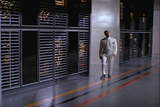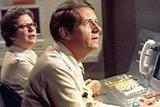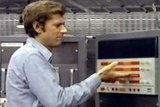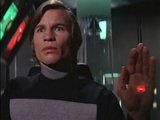1970s
Colossus: the Forbin Project (1970)
 Imagines a situation in which two governments (U.S. & Russia) decide to give super-computers control of their respective nuclear weapons, replacing flawed human decision-making with superior processing and hard cold logic. (By the way, The Terminator movies also portray humans giving weaponry controls to a 'Skynet'.)
Imagines a situation in which two governments (U.S. & Russia) decide to give super-computers control of their respective nuclear weapons, replacing flawed human decision-making with superior processing and hard cold logic. (By the way, The Terminator movies also portray humans giving weaponry controls to a 'Skynet'.)
The two machines develop a new mathematical language, advance us years in science, and take control of a few things too. They have the potential to reshape civilization and progress us beyond our own capabilities whether we want them to or not. Who says the humans always have to win?
Starring: Eric Braeden. Screenplay by James Bridges. Based on a novel by D. F. Jones: Colossus. Directed by Joseph Sargent.
Sources: IMDb | RT | MRQE | Wikipedia
The Andromeda Strain (1971)
 The epitome of SF: A team of elite scientists uses an intricate and secret underground research lab to investigate alien microorganisms (before it is too late). Includes a medical computer, automated decontamination systems, robotic arms, and SF questions about new forms of life.
The epitome of SF: A team of elite scientists uses an intricate and secret underground research lab to investigate alien microorganisms (before it is too late). Includes a medical computer, automated decontamination systems, robotic arms, and SF questions about new forms of life.
The novel has imaginative discussions about the most likely alien lifeforms, co-evolution of life, and skepticism over the survival value of human intelligence.
Starring: James Olson, Arthur Hill, David Wayne, Kate Reid. Based on the excellent novel by Michael Crichton. Directed by Robert Wise.
Sources: IMDb | RT | MRQE | Wikipedia | Technovelgy / News | Glenn Erickson
THX 1138 (1971)
George Lucas utilizes an original and excellent visual style in this vision of an antiseptic, underground totalitarian state. The state is patrolled by police-robots and operates by cost/benefit analysis of state efficiency. Has an interesting robotic confessional.
Starring: Robert Duvall, Donald Pleasence. Screenplay by George Lucas, Walter Murch. Story by George Lucas. Directed by George Lucas.
Sources: IMDb | RT | MRQE | Wikipedia | Script
Links: Google Directory | THX-1138.org Forum | Official Site
Silent Running (1972)
A future in which at least one person wants to preserve the last remnants of wilderness. He also gives reasons to love nature: he grows and nurtures it with his own hands, and it has a color, taste, smell (i.e., he loves his qualia!). Directed by a special effects legend who worked on 2001 and Blade Runner.
Trumbull says in the commentary he thinks SF is impossible in film, but he also says he loves technology and feels comfortable around it. He hates when movies anthropomorphize mechanical or android characters as in Star Wars (a project he turned down), so the three worker robots, the robotic arm, and the spacecraft equipment are all treated with respect. Has a beautiful light effect for Saturn's rings, which is inaccurate but well worth seeing, gardening robots, and a space oasis.
Starring: Bruce Dern. Written by Deric Washburn, Michael Cimino, Steven Bochco. Directed by Douglas Trumbull.
Sources: IMDb | RT | MRQE | Wikipedia | Larry Klaes
Links: Google Directory | Valley Forge
Solaris (1972)
Has a possibly sentient planet and replicants in the plot. It explores themes about morality and difficulties communicating with alien life. Possibly it argues that because we desire "mirrors, not other worlds," it's difficult for scientists to objectively attain knowledge and conduct experiments without themselves, qua humans, affecting the results.
(The shorter Soderbergh remake in 2002 is good at generalizing the difficulties of genuine communication and empathy between people, but it doesn't capture the Tarkovskiy argument about scientific knowledge and focuses instead on human disconnects.)
Starring: Natalya Bondarchuk. Screenplay by Fridrikh Gorenshtein, Andrey Tarkovskiy. Based on the novella by Stanislaw Lem. Directed by Andrey Tarkovskiy.
Sources: IMDb | RT | MRQE | Wikipedia | Google Directory
Soylent Green (1973)
Dense with dark SF ideas about a possible future with corrupt police, corporate cover-ups, food shortages, and overpopulation. The film makes a case for environmentalism, honesty, and human dignity by showing the decrepit state of civilizations without respect for those values. (Of course, the problem with the argument is that a super hi-tech civilization, such as some imagined by George Lucas, might find 'green' unfriendly ways to support, say, a city-wide planet with ethical decency.) We can't say much about the most interesting concept in the movie without spoiling it.
Stephen Hawking calculates some disturbing figures concerning future population growth (in the real world): "By the year 2600 the world's population would be standing shoulder to shoulder, and the electricity consumption would make the Earth glow red-hot" at current growth rates and projected rates of electricity consumption (The Illustrated: The Universe in a Nutshell, pp. 158-159). Obviously such a state of affairs would impact society, government, and our daily life in lots of possibly devious ways. Or, who knows, it could ignite a change so that we might use science and technology to become like Star Trek and change our society into a Roddenberry future.
Starring: Charlton Heston, Leigh Taylor-Young. Screenplay by Stanley R. Greenberg. Based on a novella by Harry Harrison: Make Room! Make Room!. Directed by Richard Fleischer.
Sources: IMDb | RT | MRQE | Wikipedia
Phase IV (1974)
 Scientists construct a dome to investigate evolved ants, but the ants form a collective intelligence and use it to attack the humans. It has some annoying ant scenes initially, but the movie has thought provoking ideas.
Scientists construct a dome to investigate evolved ants, but the ants form a collective intelligence and use it to attack the humans. It has some annoying ant scenes initially, but the movie has thought provoking ideas.
We can plausibly imagine a species using collective intelligence to have high evolutionary success (as ants have had on earth), which is what makes the Borg from Star Trek so interesting as cybernetic villains. But mutant ants would have to find novel ways to communicate with each other to develop a high level of intelligence. The movie leaves it ambiguous whether they would exhibit the same moral values as humans -- if not, then they could take advantage of hard core community rules!
Starring: Nigel Davenport, Michael Murphy, Lynne Frederick. See the novel by Barry N. Malzberg. Directed by Saul Bass.
Sources: IMDb | RT | MRQE | Wikipedia
A Boy and His Dog (1975)
Not your normal post-apocalyptic wasteland! This movie comes with an intelligent telepathic dog (named Blood), an underground totalitarian cult, security robots dressed as farmers, and one of the funniest final lines of any movie!
Many films have similar post-apocalyptic themes set in a future in which most science and technology regressed backwards: Mad Max series (1979, 1981, 1985), Testament (1983), The Day After (1983), Jericho (2006-2008, TV), etc.
Starring: Don Johnson, Tim McIntire (voice), Susanne Benton. See the novella by Harlan Ellison. Directed by L. Q. Jones.
Sources: IMDb | RT | MRQE | Wikipedia
Rollerball (1975)
A corporation tries to teach its population the futility of individualism. (Are governments the ones going in this direction today instead of corporations?) It also portrays a central computer as an unreliable library: it misplaces data on the whole thirteenth century. It won a Saturn award for best SF movie, but I felt like I had to wait a bit too long for its good ideas.
Starring: James Caan, John Houseman, Maud Adams. Screenplay by William Harrison. Based on an uncredited short story by William Harrison: "Roller Ball Murder". Directed by Norman Jewison.
Sources: IMDb | RT | MRQE | Wikipedia
Logan's Run (1976)
 Showcases a civilization policed by sandmen (privileged police officers) and governed by strict age limits and religious-conditioning (involving beliefs about 'afterlife renewal').
Showcases a civilization policed by sandmen (privileged police officers) and governed by strict age limits and religious-conditioning (involving beliefs about 'afterlife renewal').
The best part is its portrayal of a hedonist lifestyle that encourages sandmen to summon beautiful people from some sort of teleportation system. Includes an authoritarian computer, imaginative technology, and cosmetic surgery. The weak ending is built around an encounter with a mad robot and Logan's exploration of a post-apocalyptic civilization outside the dome.
Starring: Michael York, Jenny Agutter, Richard Jordan. Based on the novel by William F. Nolan and George C. Johnson. Directed by Michael Anderson.
Sources: IMDb | RT | MRQE | Wikipedia | Tech News | Script
Links: Google Directory | The World of Logan's Run | Unofficial FAQ
Star Wars (1977-1983, 1999-2005)
Inspires scientists to create gadgets that mimic things in the movies, and sends fans into a frenzy of imagination about SF possibilities such as strange new aliens and new civilizations. It follows that it must be made by a nerdy director who likes to put cool characters in alien worlds and have them play around with gadgets! And then totally refashion his first three movies with the newest of computer technology!
Although Star Wars is on the opposite spectrum of current work in science and movies like 2001, so are computer programmers and a bunch of other nerds who love technology, popular science, and progress. Star Wars inspires SF viewers more than Lucas ever intended. One excellent example of its influence is portrayed in Michio Kaku's TV series Sci Fi Science: Physics of the Impossible and in the movie SpaceCamp (Dir. Harry Winer, 1986, 55.3/D).
Written and produced by George Lucas.
Sources: IMDb | RT | MRQE | Wikipedia | Wikia | Technovelgy / News
Links: Google Directory | Star Wars.com
Invasion of the Body Snatchers (1978)
People start acting odd as they lose their humanity through assimilation by evil, automaton plants and pod people. Counter to many reviews, I like the 1978 remake better than the 1956 version since it emphasizes the SF elements (more plants, pods, genetic experiments) and it isn't as preachy about the characters' fear of losing their emotions.
The director's commentary has a couple interesting comments about parallels between the movie and our own society; he takes the pod idea as symbolic to our own de-humanization to mindless TV watching and assimilation to dominant social views.
Starring: Donald Sutherland, Brooke Adams, Jeff Goldblum. Screenplay by W.D. Richter. Based on a Collier's magazine serial by Jack Finney. Directed by Philip Kaufman.
Sources: IMDb | RT | MRQE | Wikipedia
Alien (1979). Aliens (1986).
 Alien, Dir. Ridley Scott, 1979, 83/A. Aliens, Dir. James Cameron, 1986, 84/A+. Contains many SF themes such as a central computer and an alien race, along with a heavy dose of spaceships, androids, cryogenic freezers, and controlling corporations. In the first film, I especially like the patient opening space sequence, the investigation of the alien-infested spaceship, and the creative H. R. Giger designs.
Alien, Dir. Ridley Scott, 1979, 83/A. Aliens, Dir. James Cameron, 1986, 84/A+. Contains many SF themes such as a central computer and an alien race, along with a heavy dose of spaceships, androids, cryogenic freezers, and controlling corporations. In the first film, I especially like the patient opening space sequence, the investigation of the alien-infested spaceship, and the creative H. R. Giger designs.
In the second film, Aliens, a group of marines enlist Ripley as an adviser to help investigate a terraforming colony (on LV-426). The marines have all sorts of weapons technology and an android (Bishop), but they bring along a watchful corporate official who secretly wants to preserve aliens for their immense biological warfare potential.
Starring: Sigourney Weaver. Alien, Dir. Ridley Scott. Aliens, Dir. James Cameron.
Sources: IMDb | RT | MRQE | Wikipedia | Script | Roger Ebert
Links: Google Directory | Alien Legend | Giger's Alien | The Story in Pictures
Star Trek: The Motion Picture (1979)
An ultra logical and advanced machine attacks Starfleet, replicates a human to use as a probe, and strives to meet its maker. The film has a weird and lengthy approach shot to Enterprise near the beginning, and the film didn't impress some who expected more from the first Star Trek movie. But it has solid SF elements that surpass many of the more celebrated Star Trek movies. Not to mention, the scenes at the beginning between Spock and Kirk are hilarious, and I always love to see a ship in a state of chaotic disrepair.
Starring: William Shatner, Leonard Nimoy, DeForest Kelley, James Doohan, George Takei, Nichelle Nichols, Walter Koenig, Stephen Collins, Persis Khambatta. Story by Alan Dean Foster. Screenplay by Harold Livingston. Directed by Robert Wise.
Sources: IMDb | RT | MRQE | Wikipedia | Script
Other 1970s SF and Related Movies
-
Quick mentions (future possible entries): The Omega Man (Dir. Boris Sagal, 1971), Sleeper (Dir. Woody Allen, 1973), Westworld (Dir. Michael Crichton, 1973), Dark Star (Dir. John Carpenter, 1974), Zardoz (Dir. John Boorman, 1974), The Questor Tapes (Dir. Richard A. Colla, 1974), Demon Seed (Dir. Donald Cammell, 1977), The Boys from Brazil (Dir. Franklin J. Schaffner, 1978).
-
A Clockwork Orange (1971). It challenges us with a thought provoking idea that Alex gets mistreated when the state uses conditioning mechanisms to "reform" him and thwart his free will (i.e., when a person “lovely with color and juice” is controlled like a mechanical toy). Starring: Malcolm McDowell. Screenplay by Stanley Kubrick. Based on the novel by Anthony Burgess. Directed by Stanley Kubrick. Sources: IMDB | RT | MRQE | Wikipedia | Tim Dirks | Script. Links: Google Directory | Tabula Rasa
By the way, watch Kubrick's 2001 for Dr. Heywood Floyd's great Clockwork Orange-like sentence: "It should not be difficult for all of you to realize the potential for cultural shock and social disorientation contained in the present situation if the facts were prematurely and suddenly made public without adequate preparation and conditioning" (2001 screenplay).
-
Slaughterhouse-Five (1972). Billy Pilgrim leaps (or gets ‘unstuck’) uncontrollably through 3 time periods: from being a prisoner in 1945 Dresden in WWII, to his home in New York after the war, to his life as an immortal on a distant planet (where 4th dimensional visitors observe him & give him a woman!). Goes along well with the final two-part "All Good Things..." episode of Star Trek: The Next Generation (1994). Starring: Michael Sacks. Screenplay by Stephen Geller. Based on the novel by Kurt Vonnegut: Slaughterhouse Five. Directed by George Hill. Sources: IMDB | RT | MRQE | Wikipedia
-
The Man Who Fell to Earth (1976). An alien lands on Earth, makes money in order to save his world, and becomes alienated for many possible reasons: life itself as psychologically alienating (the alien within), life in a paranoid culture, life in a commercial & capitalist society. It doesn't have much technology and I'm not entirely sure about its stance on modernism. Though, it shows how an alien could help speed up the advance of technology. That is, if you don't fall asleep first! Starring: David Bowie, Rip Torn, Candy Clark. Based on the novel by Walter Tevis. Directed by Nicolas Roeg. Sources: IMDB | RT | MRQE | Wikipedia
 We are looking for people with skills or interest in the following areas:
We are looking for people with skills or interest in the following areas:
